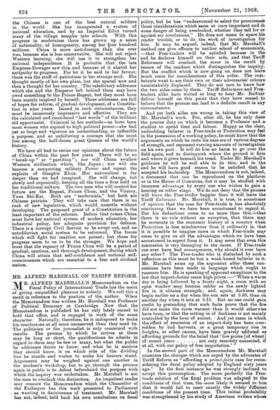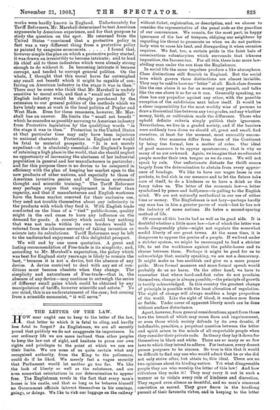MR. ALFRED MARSHALL ON TARIFF REFORM.
MR. ALFRED MARSHALL'S Memorandum, on the Fiscal Policy of International Trade has the merit of giving unqualified pleasure to nobody. We call this a merit in reference to the position of the author. When the Memorandum was written Mr. Marshall was Professor of Political Economy at Cambridge. Now that the Memorandum is published he has only lately ceased to bold that office, and is engaged in work of the same character. Naturally, therefore, he is indisposed to make his conclusions at all more unreserved than they need be. The politician or the journalist is only concerned with results. The process by which he arrives at them may be long or short, the qualifications he admits in regard to them may be few or many, but what the public he addresses desire to know, and what he is anxious they should know, is on which side of the dividing line lie stands and wishes to make his hearers stand. Arguments may be weighed against one another in the student's workshop, but to go through the process again in public is to defeat beforehand the purpose with which the inquiry was undertaken. Mr. Marshall is not - the man to overlook this distinction. An impatient reader .- may censure the Memorandum which the Chancellor of the Exchequer has this week presented to Parliament as wanting in decisiveness of treatment. Mr. Marshall has not, indeed, held back his own conclusions on fiscal policy, but he has. "endeavoured to select for prominence those considerations which seem at once important and th some danger of being overlooked, whether they tall for ,Or against my conclusions." He does not mean to spare his reader trouble, or to do the work of investigation fol. him. It may be argued, indeed, that Mr. MarshalPs method can give offence to neither school of economises, —that Free-traders will be satisfied because in the end he declares himself on their side, and that Tariff Reformers will overlook the error in the result by reason of the candour which distinguishes the inquiry. But the conflict which is now going on does not leave much room for considerations of this order. The com- batants want to see their own or their adversaries' colours unmistakably displayed. They do not care to know how the two sides came by them. Tariff Reformers and Prop traders alike have waited so long to hear Mr. Balfour deliver himself on this point that they have ceased to believe that the process can lead to a definite result in any circumstances.
And yet both sides are wrong in taking this view of Mr. Marshall's work. For, after all, he has only done the precise duty on which it becomes a Professor and ,a student to spend time and labour. Happy as the cigar, undoubting believer in Free-trade or Protection may feel in the possession of a working policy, he must know, that the arguments on which he rests his case are of various degrees of strength, and represent varying amounts of investigation on his own part. It will do him no harm to go over the field again, and to distinguish where the ground is firm and where it gives beneath his tread. Under Mr. Marshall's guidance he will be well able to do this, and in 'the end he will have good reason to be satisfied that he accepted his leadership. The Memorandum is not, indeed, a document that can be reproduced on the platform or in the House of Commons, but it may be studied with immense advantage by every one who wishes to gain a hearing on either stage. We do not deny that the process will leave the Free-trader happier than it will leave the Tariff Reformer. Mr. Marshall, it is true, is sometimes of opinion that the case for Free-trade is less absolutely convincing than we have been accustomed to regard it. But his deductions come to no more thau this,-,that there is no rule without an exception, that there may be moments in the economic history of a country when Protection is less mischievous than it ordinarily is, that it is possible to imagine cases in which Free-trade may cease to give us all the advantages which we have been accustomed to expect from it. It may seem that even this concession is very damaging to the cause. If Free,trade can ever have bad consequences, why should it ever have any other? The Free-trader who is disturbed by such a reflection as this must be but a weak-kneed believer in it. Mr. Marshall sums up the argument after these con- cessions have been made in language which ought to reassure him. He is speaking of apparent exceptions to the law that import-duties mean high prices :—" When a warm day is being followed by a frosty night, a room with an open window may become colder as the newly lighted fire in it obtains strength; and, again, darkness may begin earlier on a day when the sun sets at 5.30, than on another day when it sets at 5.15. But no one could gain credit by pretending that such facts prove that the fire did not make the room warmer than it would otherwise have been, or that the setting in of darkness is not mainly controlled by the hour of sunset. And yet cases in which the effect of remission of an import-duty has been over- ridden by bad harvests, or a great temporary rise. _in freights, or other causes, have been gravely adduced as affording grounds for the belief that ' low prices [of wheat] of recent years are only remotely connected, if at all, with our policy of free importation."
In the second part of the Memorandum Mr. Marshall examines the changes which are urged by the advocates of Tariff Reform as "affording a prina-facie case for recon- sidering the fiscal policy adopted by England sixty years ago." In the first instance he was strongly inclined to accept this presumption. The more perfectly the Free- trade solution of the fiscal problem was adapted to the conditions of that time, the more likely it seemed to him that it would fail to meet exactly the widely' different conditions of the presenttime. This initial probability was strengthened by his study of American writers whose Works were hardly known in England. Unfortunately for Tariff Reformers, Mr. Marshall determined to test American
arguments by American experience, and for that purpose to study the question on the spot. He returned from the tiniCed States "convinced that a protective policy in fact was a very different thing from a protective policy as painted by sanguine economists I found that, however simple the plan on which a protective policy started,
it was drawn on irresistibly to become intricate ; and to lend it chief aid to those industries which were already strong enough to do without it. In becoming intricate it became corrupt, and tended- to corrupt general politics. On the Whole, I thought that this moral harm far outweighed any small net benefit which it might be capable of con- ferring on American industry in the stage it was in then." There may be some who think that Mr. Marshall is unduly sensitive to moral evils, and that a "small net benefit" to onglish industry would be cheaply purchased by the extension to our general politics of the methods which we hteve lathly seen at work in the local politics of Poplar and West Ham. Even for these reasoners, however, Mr. Mar- shall has an answer. He limits the "small net benefit" which he concedes as possibly accruing to American industry from Protective legislation by' the qualifying words "in the stage it was in then." Protection in the United States at 'that particular time may only have been injurious to national character. Protection in England now would be fatal to material prosperity. "It is not merely expedient—it is absolutely essential—for England's hopes of retaining a high place in the world, that she should neglect no-opportunity of increasing the alertness of her industrial population in general and her manufacturers in particular ; and for this purpose there is no device to be compared in efficiency with the plan of keeping her market open to the new products of other nations, and especially to those of American inventive genius and of German systematic thought and scientific training." The Tariff -Reformer may perhaps argue that employment is better than Capacity, and that if manufacturers and English workmen lave the home market reserved for their exclusive use, they need not trouble themselves about any inferiority in the products with which they feed it. With English.trade concluded on the lines of a " tied " public-house, quality might in the end cease to have any influence on the demand for goods. A country which could buy nothing that was not made within its own borders would be relieved from the irksome necessity of taking invention or scienee into its calculations. Tariff Reformers may be left to the undisturbed enjoyment of this delightful prospect.
We will end by • one more quotation. A great and lasting recommendation of Free-trade is its simplicity, and, according to Mr. Marshall's expectation, the policy which was best for England sixty years ago is likely to remain the best, "because it is not a device, but the absence of any device. • A device contrived to deal with any set of con- ditions must become obsolete when they change. The simplicity and naturalness of Free-trade—that is, the vabsence of any device—may continue to outweigh the series of different small gains which could be obtained by any manipulation of tariffs, however scientific and astute." To our mind, this is an understatement of the case ; but coming from a scientific economist, "it will serve."

































































 Previous page
Previous page